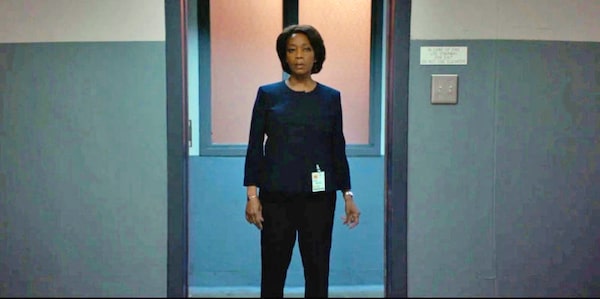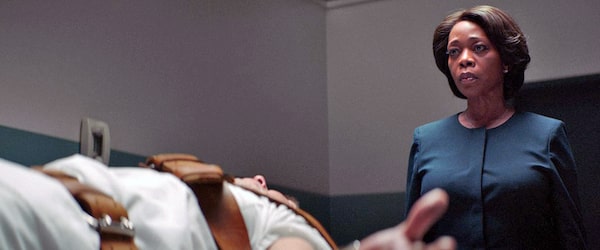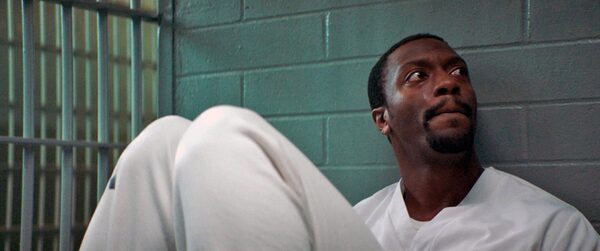
Alfre Woodard plays prison warden Bernadine Williams in Cinonye Chukwu's Clemency.ACE Pictures Entertainment
- Clemency
- Directed and written by Chinonye Chukwu
- Starring Aldis Hodge, Michael O’Neill, Alfre Woodard
- Classification R; 113 minutes
There have been many deserving women and filmmakers of colour shut out of the major awards season this year, but none so much as Chinonye Chukwu, the writer and director behind Clemency, and her formidable star Alfre Woodard, who gave the single best performance in any major motion picture last year. The fact that both of these formidable artists have only been recognized at the Independent Spirit and Gotham awards, without so much as a whisper in the conversation surrounding the SAG, Oscars and Golden Globes nominations is an injustice for all audiences.
Distracted by buzzier titles, I didn’t pay attention to Clemency when it screened at TIFF in 2019. The film’s lack of profile, ensuing in a sad, mid-January release, only proves how much further the industry needs to go when considering what makes a movie worthy of major recognition. While admittedly spartan in its stylistic approach, Clemency is wrenching in its performances and direction. Upon its premiere at the Sundance Film Festival in 2019, Chukwu became the first black woman to win the Grand Jury Prize, taking home the award for this humanist drama about the heavy toll capital punishment takes on both an innocent male prisoner and the black female warden facilitating his death. This is a film with an unforgettable story and performances that will edge into your DNA.

Woodard's character is tasked with administering a lethal injection to inmate Anthony Woods, convicted of killing a police oficer.ACE Pictures Entertainment
Just like the film’s complicated anti-heroine, who uses bureaucratic language and the occasional after-work whiskey as her way to cope with a profession that is steadily erasing her soul, Chukwu’s cinematic approach is full of restraint, relying on long takes and an effective reliance on holding closeups past their breaking point. Clemency concerns the woman in charge, Bernadine Williams (played by Woodard with incredible complexity and depth), tasked with administering her twelfth lethal injection. The fate of prisoner Anthony Woods (Aldis Hodge, who matches Woodard’s performance pound for pound) is in her more-than-capable hands, despite the fact that he maintains his innocence for a charge of killing a police officer. As Anthony searches Bernadine’s face for hope that he can evade death row, she always tows an uneasy bureaucratic line. Bernadine’s struggle to repress her emotions in the face of a justice system that continues to victimize people of colour makes your heart break for both her and Anthony. Her job may be her identity, but what does it mean to take pride in your work here? By the final shot, which holds on a wrenching three-minute closeup of Bernadine watching Anthony’s life extinguish, you see the light in her eyes go out, too.

Aldis Hodge matches Woodard's powerful performance as the film's condemned inmate.ACE Pictures Entertainment
It is rare for anyone to make a complex, grown-up drama about capital punishment. Previous films about the subject, such as Dead Man Walking, The Green Mile and Monster’s Ball, were celebrated at the Oscars for all the wrong reasons. These melodramas often featured white saviours tasked with reconciling America’s fraught history of race relations by befriending (or in the case of Monster’s Ball, sexually assaulting) the victims of a broken system. Halle Berry may have gotten her Oscar for playing Leticia Musgrove, a grieving widow who happens to fall in love with a racist prison guard – who happened to execute her late husband – but the degradation of her character, which the movie wanted to call love, didn’t exactly move the genre forward.
In Clemency, Chukwu offers countless scenes in which both the warden and her prisoner are given complex characterization as more than just symbolic gestures. It’s also certainly the first film about capital punishment where a black woman has her own power and agency. I just keep thinking about a moment early on when Bernadine drops by Anthony’s cell to inquire what food he would like to eat as his last meal. As he drops into shocked silence, Bernadine tries gamely to make it through the surreal horror of their conversation, assuring him he can have anything he likes, including a halal option. Eventually, she ticks off “no meal/fasting” on her little checklist. At home, her husband (played by The Wire’s Wendell Pierce with so much tenderness, you yearn for another movie about their broken marriage) begs her to consider early retirement so he no longer has to contend with what he calls his shell of a wife. Chukwu’s film understands the painful choices Bernadine makes to maintain her position, subtly pointing to systemic issues of race, power and gender without a pat resolution. This is a formidable director with the perspective, cinematic language and empathy to make two compelling characters – people of colour previously invisible to mainstream audiences – be seen clearly on screen.
Her screenplay also takes inspiration from the 2011 execution of Troy Davis, a black man convicted of killing a police officer in Georgia despite a significant amount of evidence pointing to the contrary. Bernadine carries the heavy burden of cases like these on her sloping shoulders, even when she’s trying her best to let her husband pass her a glass of white wine as she tries to dance with him to a record that reminds them of happier times. I guess when you’re an instrument of death, you can’t help taking your work home with you.
Clemency opens Jan. 17.